december-top.html
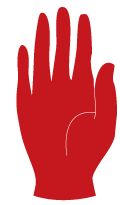 722 Fergal mac Máele Dúin died on this day in the year 722. He was a member of the powerful O’Neill clan in the south of Ireland. In 710, he claimed the title High King of Ireland after the death of another of the O’Neill leaders.
722 Fergal mac Máele Dúin died on this day in the year 722. He was a member of the powerful O’Neill clan in the south of Ireland. In 710, he claimed the title High King of Ireland after the death of another of the O’Neill leaders.
The O’Neill clan was made up of several kings and leaders. Fergal made allies of some, and enemies of others. As High King, he was regularly drawn into battles to defend his position, or assist one of his allies.
He was killed during one of these battles in 722. One of his followers, the King of Munster had died a years earlier, and the territory had been invaded by the Murchad mac Brain Mut, the King of Leinster. Fergal retaliated by attacking Leinster, and an uneasy truce was made.
Murchad broke that truce and regained control of the land. Fergal was killed as he entered into battle again. This time he was unsuccessful and was slaughtered by the Leinster Army. Fergal’s death dealt a tough blow to the O’Neill family.
Click here to read more about Irish history
Click here to read more about the history of the Irish name O’Neill
Click here to read about the history of hundreds more Irish names
* * *
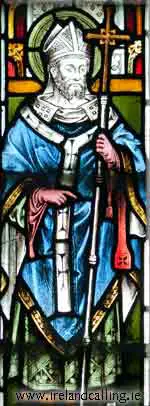 1225 Laurence O’Toole was canonised by Pope Honorius III on this day in 1225. O’Toole had died only 45 years earlier.
1225 Laurence O’Toole was canonised by Pope Honorius III on this day in 1225. O’Toole had died only 45 years earlier.
He had been the Archbishop of Dublin at the time of the Norman invasion in the late 12th century.
O’Toole was the brother-in-law of Dermott Mac Murrough. Mac Murrough had been ousted from his position as King of Leinster by Rory O’Connor.
He requested the permission of Henry II to recruit Norman knights to regain his power.
Mac Murrough and his new army arrived at Dublin and O’Toole went out to try and negotiate a peaceful conclusion rather than waste any lives in battle.
He was making progress with Mac Murrough but some of the Norman knights stormed the city without receiving the order and slaughtered hundreds of civilians.
O’Toole rushed back and managed to end the massacre, but the city was now back in Mac Murrough’s control.
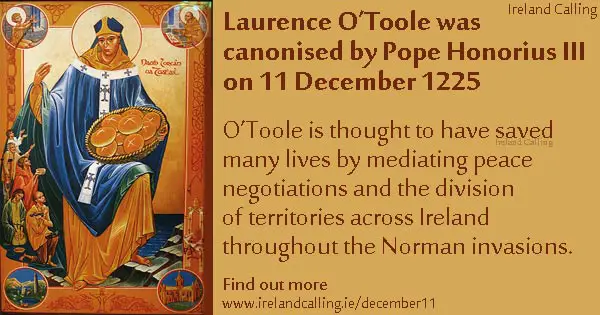
Despite the violence in Dublin, O’Toole was respected for his ability to end the slaughter. He was in a unique position in Ireland as he had the ear of all of the warring factions. The native Irish clans respected him as an honourable and intelligent man, as did the Anglo-Norman invaders.
O’Toole is thought to have saved many lives by mediating peace negotiations and the division of territories across Ireland throughout the Norman invasions.
Click here to read more about the Norman invasion of Ireland
* * *
1920 The Burning of Cork took place on the evening of 11th December in 1920. It was one of the worst atrocities of the Irish War of Independence.
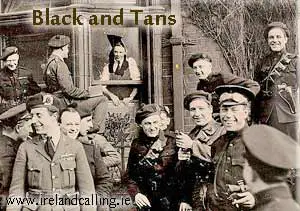 It was an act of retaliation by the Black and Tans, the auxiliary British soldiers. A group had been ambushed by an IRA unit, and one of the British soldiers named Spencer Chapman was killed by a grenade.
It was an act of retaliation by the Black and Tans, the auxiliary British soldiers. A group had been ambushed by an IRA unit, and one of the British soldiers named Spencer Chapman was killed by a grenade.
Cork was one of the main cities of IRA activity during the War of Independence. Martial Law had been declared only a day earlier following
The British troops responded with a brutal show of violence and intimidation of the people of Cork. They stormed through the city, setting fire to buildings and verbally, and in some cases, physically abusing civilians.
Two IRA members were shot dead in their homes, and a woman also died of a heart attack after Black and Tans forced their way into her house.
It was reported that more than 40 business properties were burnt to the ground, as well as 300 homes. The Black and Tans refused to let the fire brigade fight the flames. They shot at them to force them to retreat and also blocked them off from getting to the water supplies.
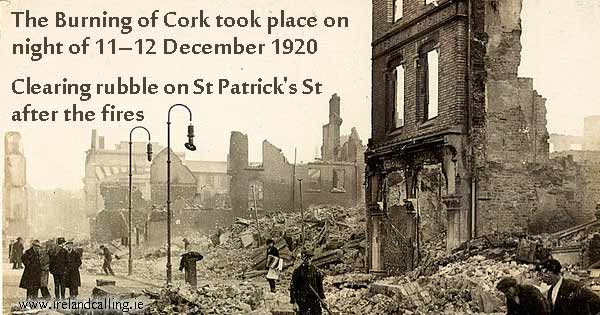
The attack came about because the IRA had ambushed two lorries carrying the Black and Tans earlier that night. They had realised that the lorries always left the barracks at the same time, and took the same route into the centre of Cork. On this occasion a group of IRA soldiers ambushed the lorries with pistols and grenades. The Black and Tans escaped and took refuge in a nearby pub, where they ordered everyone to put up their hands to be searched.
They were furious at being ambushed and bloodthirsty for revenge. One young man in the pub was reportedly dragged out into the road, ordered to strip naked and stand and sing God Save the King at gunpoint.
The Black and Tans then set about destroying the Catholic community in Cork. They set numerous buildings alight and beat anyone who attempted to put the fires out. They quickly extinguished a house fire themselves, upon hearing the property belonged to a Protestant.
They continued the rampage of destruction and violence into the early hours of the 12th December 1920, smashing up buildings and vehicles, burning properties and intimidating, in some cases physically beating, the locals. There was an estimated £3m worth of damage done in about 10 hours.
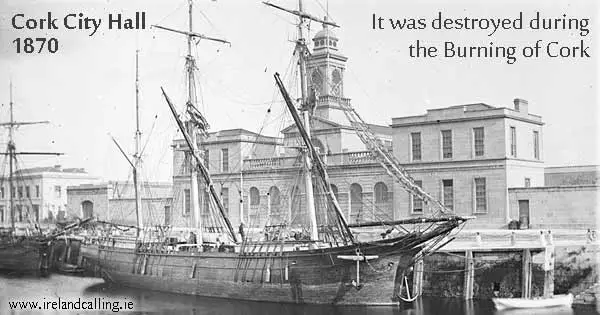
* * *
1961 Happy birthday to Dave King, born in Dublin on this day in 1961. He is the lead singer and writer for Irish band Flogging Molly. King moved from Ireland to America in his early twenties and started singing and performing. He had got a love for the guitar from a very young age, when he saw David Bowie performing on the television.
In 1997, King formed Flogging Molly in Los Angeles. They have since sold more than a million albums worldwide and are one of the top Celtic rock bands around. King is married to his fellow band member Bridget Regan.
Click here to read more about Flogging Molly
Click here to read about more Irish bands
* * *
2002 The Jeanie Johnston replica famine ship arrived in Dublin on this day in 2002. It had been built to be used as a history museum, to give people today an idea of the hardship and suffering that was suffered in Ireland during the ‘Great Famine’.
The ship had been given the final touches in Cork, before being transported to Dublin and being opened up to the public. It is now one of the most popular tourist attractions in the city, as well as being used as a venue for corporate events and functions.
Click here to read about more great tourist attractions in Dublin
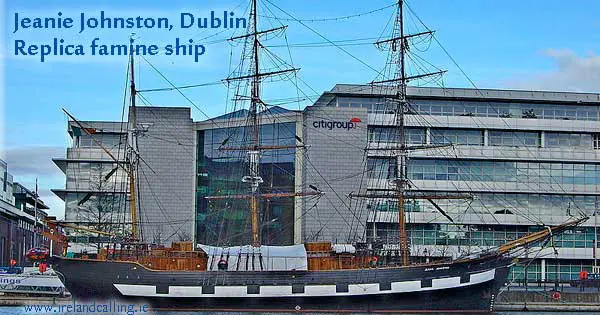
See our Informative, easy to read articles on the key events of the ‘Irish Potato Famine – Ireland’s holocaust’
* * *
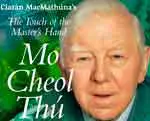 2009 Ciarán Mac Mathúna died on this day in 2009. He was a broadcaster and expert in traditional Irish music. Mac Mathúna was widely regarded to be the most knowledgeable man in the world in regards to Irish music, songs and tradition.
2009 Ciarán Mac Mathúna died on this day in 2009. He was a broadcaster and expert in traditional Irish music. Mac Mathúna was widely regarded to be the most knowledgeable man in the world in regards to Irish music, songs and tradition.
He presented a weekly radio show called Mo Cheol Thú (translated to ‘You Are My Music’) for 25 years, on which he discussed and played classic Irish folk songs. His funeral was attended by numerous Irish musicians and personalities, including Nobel Prize winning poet Seamus Heaney, who made a speech that include the following:
“Over a lifetime he helped the population of Ireland to realise the beauty, strength and value of their native cultural possessions, above all their musical culture. The musical instrument which Ciaran played to magical effect, and which entranced generations of listeners, was his own voice.”
Click here to read about some great Irish bands, singers and songs
Click here to read more about Seamus Heaney
Click here to read some of the best Seamus Heaney quotes
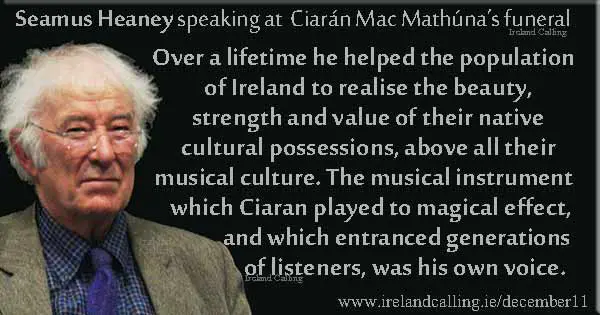
december-bottom.html